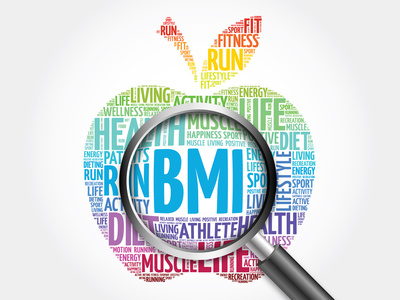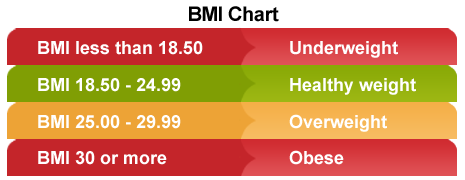Hello everyone! Welcome to LoweringYourBMI.com. When I was told that I had to lower my Body Mass Index (BMI) by 2 points (or lower it under 27) in order to qualify for a lower 2017 insurance premium, I immediately thought, okay let’s start my diet.
But what really is BMI? According the index chart, not only am I overweight, I am obese! For my 5 foot 4 inch frame, I am too fat. Maybe, that is why my knees hurt!
So my journey begins learning all about body mass and implementing a plan that will work for me to reduce this number by August!
Everything You Need to Know About Your BMI

When discussing weight, the term “BMI” is often thrown around. You may see people talking about what a healthy BMI should look like, or mentioning that someone’s BMI signifies that they’re obese. But what does it all mean?
The term BMI stands for body mass index. It’s a formula that allows people to compare their weight to their height. Because teenagers often see significant fluctuations in their weight and height, it’s designed with people who are twenty or over in mind.
What Is a Healthy BMI?
Ideally, a person’s BMI should be between 18.5 to 24.9. Numbers in this range signify a healthy, height appropriate weight. Anything below 18.5 classifies a person as underweight, and anyone between 25 to 29.9 is classified as overweight.

If someone has a BMI that’s over 30, they’re considered to be obese. That is where I fall.
How Can I Find Out What My BMI Is?
Although there are lots of tools that will calculate your BMI for you, you can also figure it out on your own. All you’ll need is a calculator and some scrap paper.
Step 1: Figure out what your height is in inches.
Step 2: Take that number and multiply it by itself.
Step 3: Take your weight in pounds and divide it by the number you’ve received from that calculation.
Step 4: Take the number you get from that equation and multiply it by 703

For example, if you’re 64 inches (5’4″), you’d multiply 64 by 64. This is 4096.
Take your weight in pounds and divide it by the number you’ve received from that calculation. If you’re 5’4″ and 175 pounds, you’d divide 175 by 4096.
Take the number you get from that equation and multiply it by 703. That number is your BMI. In this case, it is 30.03.
Most people, will want to invest in a smart scale that can track your weight body fat percentage and body mass index (BMI).
 Not only do these scales track weight, they also measure your body fat percentage and body mass index. You can easily see the important numbers you need without complex calculations.
Not only do these scales track weight, they also measure your body fat percentage and body mass index. You can easily see the important numbers you need without complex calculations.
The #1 selling smart scale on Amazon, is the Fitbit Aria WiFi Smart Scale. Click on the link to read more about it.
What Should I Do If My BMI Is High?
If the number you receive from the above calculation is 25 or higher, you’re clinically overweight. A high BMI can increase your risk for developing a number of health problems, including diabetes and heart disease.
Thankfully, once you’re aware of the problem, you can take steps to fix it. There are a lot of simple things you can do to lower your BMI and get your weight at a healthy level. For example, you could:
* Drink water instead of juice or soda
* Cut back on red meat
* Start exercising a few times a week
* Reduce your portion sizes
* Snack on vegetables instead of processed foods
Even small changes can have a big impact on your overall weight. If you’re only a little bit overweight, you should be able to shed those pounds with ease.
Is BMI an Accurate Indicator?
Some people say that BMI is inaccurate because it doesn’t take muscle mass into account. Although it’s true that muscle weighs more than fat, it’s important to remember that BMI was designed to be an indicator tool. If you’re a weightlifter, you know you’re not overweight. However, if someone is working to maintain a healthy weight, being aware of your BMI can be extremely valuable.
As we all know, your weight can have a big impact on your health. Reaching a healthy weight can help you avoid numerous ailments, and can greatly extend your lifespan. Use the BMI calculation to learn the weight that you’d be healthy at.
Next Steps –
Over the next few months, I plan to focus on Nutrition, Fitness and Motivation. I will be documenting my research and results attained.
I have recorded my starting point using my smart scale – weighed myself, know my BMI, and have set a realistic goal. It is time to start.
I invite you to join me. This is a start of a new year and for me a new healthier lifestyle!



